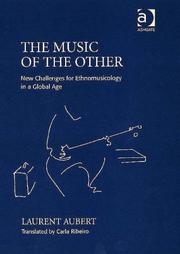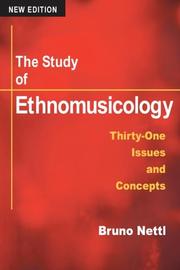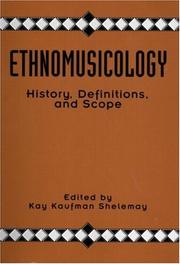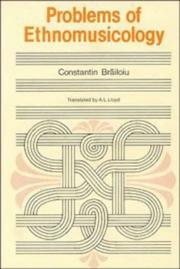| Listing 1 - 10 of 86 | << page >> |
Sort by
|
Book
ISBN: 0252051181 9780252051180 9780252042348 0252042344 9780252042348 Year: 2019 Publisher: Urbana : University of Illinois Press,
Abstract | Keywords | Export | Availability | Bookmark
 Loading...
Loading...Choose an application
- Reference Manager
- EndNote
- RefWorks (Direct export to RefWorks)
Ethnomusicologists have journeyed from Bali to Morocco to the depths of Amazonia to chronicle humanity's relationship with music. Margaret Sarkissian and Ted Solâis guide us into the field's last great undiscovered country: ethnomusicology itself. Drawing on fieldwork based on person-to-person interaction, the authors provide a first-ever ethnography of the discipline. The unique collaborations produce an ambitious exploration of ethnomusicology's formation, evolution, practice, and unique identity. In particular, the subjects discuss their early lives and influences and trace their varied career trajectories. They also draw on their own experiences to offer reflections on all aspects of the field. Pursuing practitioners not only from diverse backgrounds and specialties but from different eras. Sarkissian and Solâis illuminate the many trails ethnomusicologists have blazed in the pursuit of knowledge. A bountiful resource on history and practice, Living ethnomusicology is an enlightening intellectual exploration of an exotic academic culture.
Ethnomusicology --- Comparative musicology --- Ethnology --- Musicology
Book
ISBN: 1800105886 Year: 2022 Publisher: Rochester : University of Rochester Press ; : Boydell & Brewer,
Abstract | Keywords | Export | Availability | Bookmark
 Loading...
Loading...Choose an application
- Reference Manager
- EndNote
- RefWorks (Direct export to RefWorks)
"What is Asafo ndwom (music)? How and when is it performed? What is the state of this tradition that once served as the bedrock of the societies? How does Asafo enact the past and serve as archives for the people? In an attempt to answer these questions, Walking with the Asafo of Ghana investigates the musical pasts of a warrior association. The book is an ethnography of walking, organized into eight chapters. Each chapter ends with an "ethnographic voice," in which Aduonum sums up the main ideas. It is Aduonum's attempt at an anticolonial and decolonialist African musicology, one that subverts and decenters white racial framing of research, analysis, and presentation, disrupting how Euro-American concepts frame our ways of telling and experiencing ndwom. Aduonum's goal on this trajectory is to tell her story, create something new, and chart a new path. Through this fluid and complex book, she repositions African Elders' knowledge as "epistemologies of decolonization and de-coloniality" and centers the stories shared by local Fante scholars. The text is polyvocal, multimodal, multiperspective, performative, reflexive, and dialogic, informed by the structure of Asafo ndwom, appellations, proverbs, her mentors' tellings, and "embodied" calling and responding. It is a performative scholarly discourse, ndwom-based: a performance. As a celebration of Asafo, those warriors who insisted their lives matter, the text is meant to be read and performed."
Ethnomusicology. --- Comparative musicology --- Ethnology --- Musicology

ISBN: 9780754653431 9780754653424 0754653439 0754653420 Year: 2007 Publisher: Burlington, VT : Ashgate,
Abstract | Keywords | Export | Availability | Bookmark
 Loading...
Loading...Choose an application
- Reference Manager
- EndNote
- RefWorks (Direct export to RefWorks)
Ethnomusicology. --- Ethnomusicologie --- Ethnomusicology --- Comparative musicology --- Ethnology --- Musicology
Book
ISBN: 9780199844869 Year: 2013 Publisher: New York : Oxford University Press,
Abstract | Keywords | Export | Availability | Bookmark
 Loading...
Loading...Choose an application
- Reference Manager
- EndNote
- RefWorks (Direct export to RefWorks)
Ethnomusicology. --- Ethnomusicologie --- Ethnomusicology --- Comparative musicology --- Ethnology --- Musicology

ISBN: 9780252072789 9780252030338 0252072782 0252030338 Year: 2005 Publisher: Urbana : University of Illinois Press,
Abstract | Keywords | Export | Availability | Bookmark
 Loading...
Loading...Choose an application
- Reference Manager
- EndNote
- RefWorks (Direct export to RefWorks)
Ethnomusicology. --- Ethnomusicologie --- Ethnomusicology --- Comparative musicology --- Ethnology --- Musicology
Book
ISBN: 0199886709 1281868272 9786611868277 0199717192 9780199717194 0195324951 9780195324952 019532496X 9780195324969 9780195324952 9780195324969 0197729053 Year: 2023 Publisher: Oxford : Oxford University Press,
Abstract | Keywords | Export | Availability | Bookmark
 Loading...
Loading...Choose an application
- Reference Manager
- EndNote
- RefWorks (Direct export to RefWorks)
The contributors consider fieldwork as an issue-laden practice rather than as a methodology requiring a prescriptive manual, challenging the very notion of fieldwork, its goals and its place in historical studies.
Ethnomusicology --- Comparative musicology --- Ethnology --- Musicology --- Fieldwork. --- Fieldwork
Book
ISBN: 0252097335 9780252097331 9780252039287 0252039289 9780252080821 0252080823 Year: 2015 Publisher: Urbana, Chicaggo, Springfield, [Illinois] : University of Illinois Press,
Abstract | Keywords | Export | Availability | Bookmark
 Loading...
Loading...Choose an application
- Reference Manager
- EndNote
- RefWorks (Direct export to RefWorks)
Ethnomusicology. --- Comparative musicology --- Ethnology --- Musicology --- Ethnomusicology --- 78
Book
ISBN: 0199794588 0199794375 9780199794584 9780199397549 0199397546 9780199375257 0199375259 9780199794379 Year: 2014 Publisher: [Oxford] : Oxford University Press,
Abstract | Keywords | Export | Availability | Bookmark
 Loading...
Loading...Choose an application
- Reference Manager
- EndNote
- RefWorks (Direct export to RefWorks)
Ethnomusicology, an academic discipline founded in 1950, has been defined as the study of the music of others. This definition, at once whimsical and very nearly true, is incomplete. Many of its strongest threads have emerged because a person or a people have wanted to understand themselves, their history, and their identity. In this work, Timothy Rice offers a compact and illuminating account of this growing discipline showing how modern researchers to about studying music from around the world, looking for insights into both music and humanity.
Ethnomusicology. --- Comparative musicology --- Ethnology --- Musicology --- Ethnomusicology

ISBN: 0815307640 Year: 1992 Volume: 1 Publisher: New York ; London Garland
Abstract | Keywords | Export | Availability | Bookmark
 Loading...
Loading...Choose an application
- Reference Manager
- EndNote
- RefWorks (Direct export to RefWorks)
Ethnomusicologie --- Ethnomusicology --- Comparative musicology --- Ethnology --- Musicology --- 78.31

ISBN: 0521245281 Year: 1984 Publisher: Cambridge Cambridge University Press
Abstract | Keywords | Export | Availability | Bookmark
 Loading...
Loading...Choose an application
- Reference Manager
- EndNote
- RefWorks (Direct export to RefWorks)
Ethnomusicologie --- Ethnomusicology --- Comparative musicology --- Ethnology --- Musicology --- 78.31
| Listing 1 - 10 of 86 | << page >> |
Sort by
|

 Search
Search Feedback
Feedback About UniCat
About UniCat  Help
Help News
News